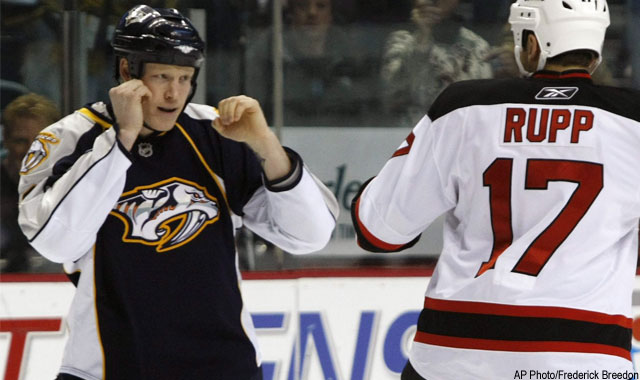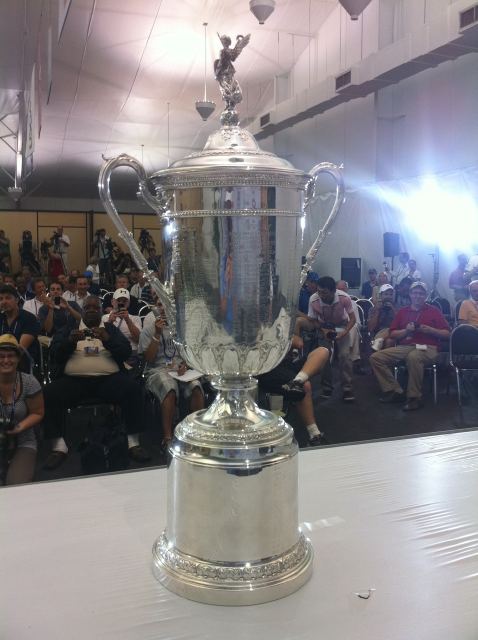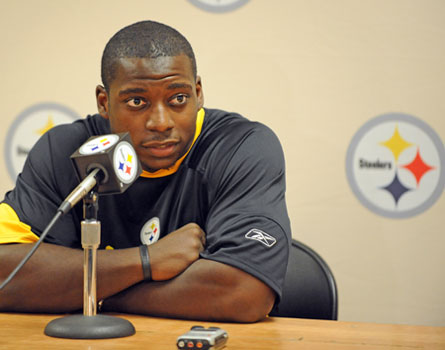
Keyword: Twitter
-
Can the Players' Associations do more?
by Joe Jackman 09-07-2011 02:20 AM Crisis Management | Human Relations | Labor | Sports Psychology
Another NHL Enforcer Found Dead.Fifteen-year NHL defenseman and pugilist Wade Belak, who spent his career with the Colorado Avalanche, Calgary Flames, Toronto Maple Leafs, Florida Panthers and recently retired as a Nashville Predator, was found dead on August 31 at the age of 35. Reports indicate that it was a suicide.3 NHL Players Dead This 2011 Off-SeasonBelak joins other deceased NHL enforcers Rick Rypien (depression) and Derek Boogaard (pill addiction). Belak, who retired in March, didn't show any signs of similar afflictions. In fact, he seemed to be transitioning well from the life of a professional athlete. He had secured a media role with the Predators and was to appear on Battle of the Blades, a Canadian television reality-show partnering former professional hockey players and figure skaters in competition.“The NHLPA Does Nothing To Prepare You”Former NHL enforcer and current ESPN broadcaster Matthew Barnaby commented on Twitter, “Nhlpa should do better job of preparing to enter league- and departing it! FACT.“ These deaths are raising questions about the NHL and NHLPA programs aimed at reaching out to active and former players."With what's transpired in the last few months, with the guys that we've lost, it makes us open up our eyes and look at programs and know that once guys are done playing hockey we just don't kick them to the curb," said former NHL player Nick Kypreos in a sportsnet.ca column. “We've got to come closer to the current players and the people who run the league and say: 'Once you're in this fraternity, you're in it for life.'"Former NHL enforcer Tyson Nash also Tweeted, "Ur entire life is dedicated to hockey and then one day it's all over and ur kicked to the curb! And the NHLPA does nothing to prepare u."The NHL, NBA & NFL Have Support ProgramsIn fairness, the NHL Alumni Association facilities a “Life After Hockey / BreakAway Program,” which is funded by the National Hockey League, and the NHL Players' Association. Their goal is to “support and develop customized, relevant programs and services that address the unique post-game and off-season challenges that elite athletes face.” The NFL and NBA also have player development programs… but is the message getting through? Ron Stern, a former 12-year NHL player, told Access Athletes, “The players themselves need to take control of their future to ensure lifelong success.”Feeling All Alone“The most challenging and difficult part of my transition from the game was that I felt like I was the only player to feel what I was feeling, and the only player to go through what I was experiencing," Stern continued as he reflected on his feelings of isolation. “For the first time in my life, I was no longer part of a ‘team’ and as a result I felt alone on this—the next chapter of my life. Being part of ‘something more’ ran much deeper than I had ever expected. After all, for pretty much my entire life, my vision, mission, purpose, goals and even, to a large extent, values were ‘the team's’, and were determined by ‘the team'. My sense of identity revolved around the game of hockey, the team and those involved in the game. Had I been prepared for, and realized, the importance of determining these goals on a more individual level, I am certain that my transition would have been much easier.”We Need Coaches After Our Sports Careers Are OverIn learning from his own experiences and gaining perspective into other athlete's stories, Ron wanted to ensure all elite athletes never feel alone, so he co-founded Octane - High Performance Mentoring, which augments the NHL programs.Octane provides elite and professional athletes with business and life coaching support, which is needed as athletes struggle to lead healthy, balanced, fulfilling post-game lives. Theo Fleury, who played over 1,000 games in the NHL, and was an Olympic Games Gold Medalist, participated in such a program. “We all need mentors and coaches when we leave the playing field," Fluery told me. "Life after sport is a huge transition period. A program like this helps you get focused for the second half of your life. Our professional careers have been influenced by many coaches. This is no different. We need coaches after our sports careers are over. We need to start preparing for life after sports while we are still playing.”Don’t Wait Until You Are RetiredUnfortunately, no matter what the sport, the vast majority of professional athletes do not realize the time to explore and pursue life after sports options is during their off-season, not after their retirement from the game. Athletes need to act while their name and their brand is recognizable. They need to leverage their celebrity status and use it as a stepping-stone to plan and secure their future. They need to gain an understanding of who they are and find clarity about their life purpose beyond the game. They need to unlock other talents and implement a development strategy so they can capitalize on their brand. It’s about discovering other passions in life and identifying possibilities the future can hold.Bankruptcy, Joblessness, DivorceThe well-known SI article How (and Why) Pro Athletes Go Broke by Pablo Torre reported that "By the time they have been retired for two years, 78% of former NFL players have gone bankrupt or are under financial stress because of joblessness or divorce." Additionally, this article found that "Within five years of retirement, an estimated 60% of former NBA players are broke.
“The smart guys start their second career during their first career," commented NFL Pro Bowler Ovie Mughelli—a player who gets it—during an exclusive interview with Access Athletes. "Athletes have to leverage their celebrity and leverage their contacts so that when they finish professional sports they already know what they’re going to do, as opposed to waiting until your done and trying to find yourself.”Build Your Future, Invest In YourselfAthletes need to give themselves every advantage to extend their brand beyond the game, to branch off into the business world and be recognized as an elite athlete, executive, entrepreneur and philanthropist. Obviously the transformation from a world-class athlete does not happen overnight. It takes a carefully orchestrated business strategy. Taking small steps while in the game will eventually help athletes avoid the post-game challenges so many face.Find A MentorThose that have the support of business coaches and mentors are better equipped to realize their full potential, to create opportunities which will drive lifelong personal fulfillment. Anyone who has reached the pinnacle of their sport will tell you that coaching and mentoring played a major part in their success. The same support network and structure is required to ensure a successful post-athletic career transition. Players need to identify business passions and strengths, motives and values outside of the game. They need to develop a life after sports transition plan early in their career so they are best prepared to tackle the enormous challenges ahead.How To Eliminate Confusion, Uncertainty And FrustrationJocelyn Lemieux, a former 12-year NHL player, offered this sound advice when I asked him how elite athletes can avoid a rocky transition to their post-athletic careers: “Get some business or work experience while you are in the game, during the off-season. Find a mentor, a coach to learn about yourself and the business world, or test drive a second career through a summer internship. Then when you do retire from the game, you will eliminate the years of confusion, uncertainty and frustration I faced.”
Published 09-07-2011 © 2025 Access Athletes, LLC
Keywords: "Battle of the Blades", "How (and Why) Pro Athletes Go Broke", "Life After Hockey/BreakAway Program", Bankruptcy, Calgary Flames, Colorado Avalanche, Deceased NHL Enforcers, Depression, Depression and Pro Athletes, Derek Boogaard, Divorce, Drug Abuse, elite athletes, ESPN Broadcaster Matthew Barnaby, Florida Panthers, Former Players, Going Broke, Joblessness, Jocelyn Lemieux, Joe Jackman, Leveraging Your Celebrity, Mental Illness and Professional Athletes, mentorship, Nashville Predators, National Hockey League, NHL, NHL Players' Assocition, NHL Programs, NHLPA, Nick Kypreos, Octane - High Performance Mentoring, Olympic Games Gold Medalist, Ovie Mughelli, Pablo Torre, Pill Addiction, Post-Athletic Career Transition, remBrand Sports, Rick Rypien, Ron Stern, Sports Illustrated, Sportsnet.ca, Suicide, Theo Fleury, Toronto Maple Leafts, Twitter, Tyson Nash, Wade Belak -
Think Before You Tweet
by Jason Krump 06-21-2011 01:09 AM Crisis Management | Human Relations | Labor | Sports Psychology
-
Athletes: Everything You Say Matters
by Joe Jackman 05-18-2011 11:58 PM Crisis Management | Human Relations | Labor | Sports Psychology
-
Lessons from the Jay Cutler Story
by Jason Krump 02-03-2011 10:45 PM Crisis Management | Human Relations | Labor | Sports Psychology



